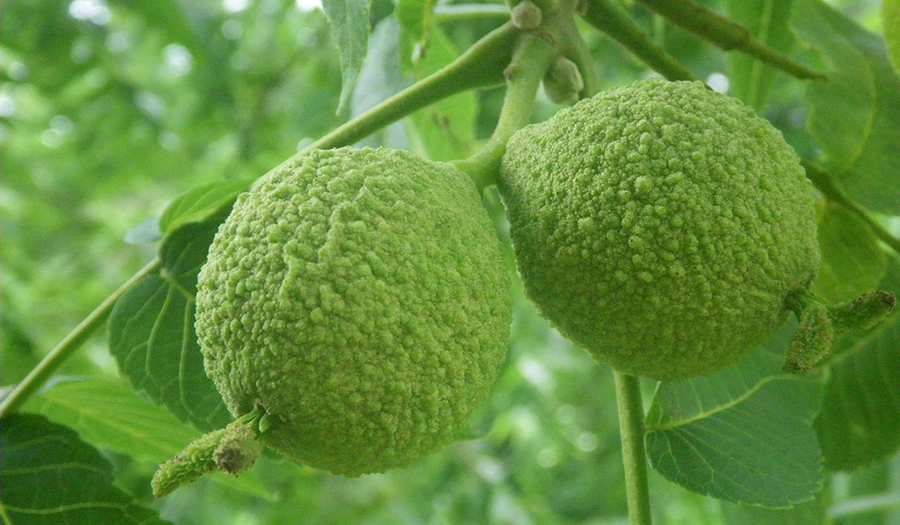BLACK WALNUT HULL
(Juglans Nigra)
Black Walnut tree is native to Eastern North America but is cultivated in many parts of the world. Black Walnut hulls have been used in herbal medicine for centuries to treat various conditions including intestinal problems, snake bites, open wounds, ulcers, and as a laxative. Because of its dark color, the hull was also used as a dye and commonly used to dye hair.
Black Walnut is rich in nutrients and is a good source of beta-carotene, calcium, tannin, iron, magnesium, manganese, phosphorus, potassium, selenium, silicon, zinc, B Vitamins and Vitamin C.
Black Walnut Hulls are available as extract, tincture, powder and capsules.
USES:
Some of its many uses include the following:
- Black walnut is known as an effective anti-viral and is used to treat warts which are caused by viruses.
- Black walnut is an anti-fungus and has been used to fight herpes, cold sores, athlete’s foot, and Candida.
- It has been used as an antiseptic to combat sexually transmitted infections; it is also used to treat malaria and some forms of acne.
- Black walnut hull is a gentle laxative.
- It can be effective in controlling excessive sweating.
- The herb is said to help control menorrhagia, the excessive loss of blood during periods.
- It helps with skin conditions such as boils and acne
- It is also used to control diarrhea.
HOW TO USE IT
- Blood Pressure & CholesterolBlack Walnut Hull may help to lower blood pressure and serum cholesterol levels. It is also believed to burn up toxins and harmful fat deposits while balancing blood sugar levels.Tincture, extract and capsules are all effective methods of ingesting Black Walnut Hulls for this purpose.
- Excessive SweatingBlack Walnut Hull (and leaves) contain tannins whose astringent quality is thought to shrink the sweat glands and reduce excessive sweating. Research has revealed that the tannins in Black Walnuts ma help calm hyperactive sweat glands and decrease their activity. This means you can say goodbye to sweaty palms and feet. As always, it is best to see your doctor first in order to determine the exact cause of hyperhidrosis (excessive sweating), and whether or not it requires attentive medical care.
- Digestive TonicBlack Walnut Hull has shown to have tonic effects on digestion and the intestinal system. It helps to relieve colic, heartburn and flatulence. As a cholagogue, it stimulates the flow of bile into the intestines and is thought to ease bilious colic and pain in the spleen. Capsules is the best form to take Black Walnut as digestive tonic.
- Intestinal CandidaCandida is a natural part of our gut flora. However, poor hygiene and poor diet can lead it to multiply excessively, disrupting the sensitive balance of gut flora populations. This may lead to inflammatory diseases such as Crohn’s disease. Due to its powerful anthelmintic properties, Black Walnut Hulls keep Candida populations under control.
- Anti-ParasiticThe most well known characteristic of Black Walnut Hull is its ability to expel intestinal parasites. As a laxative it expelsparasites; and its high tannin and juglone content is thought to oxygenate the blood and kill parasites. Black walnut is effective against pinworm, ringworm, tapeworm, and other intestinal parasites.“Black walnut hulls contain juglone, a chemical that is antibacterial, antiviral, antiparasitic, and a fungicide. As a skin wash, black walnut hulls are used to treat ringworm and yeast infections of the skin. Taken internally, black walnut hulls are used to treat intestinal worms.” –Mountain Rose HerbsFor parasites, the capsules should be taken with a large cup of water an hour or so before any meal.
CONTRAINDICATIONS
- According to The American Cancer Society, you should avoid black walnut products if you have a known sensitivity to other nuts, especially pecans.
- It is not safe to use during pregnancy. Use while pregnant could theoretically cause birth defects or negatively impact the growth of the fetus, or potentially cause a miscarriage.
- Exposure to black walnut hulls in any form is known to produce certain reactions in ponies and horses ranging from localized dermatitis to a type of vascular disease called equine laminitis that affects the feet.
- As all other herbs, it should be taken under the supervision of a health care professional.
SCIENTIFIC DETAILS
Family Name: Juglandaceae
Common Name(s): Black Walnut Hull
Part(s) Used: Outer covering of the nut (hull)
Habitat: Fertile soils in mixed hardwood forests. Also grows well in pastures, meadows, and slopes.
Properties: anthelmintic; anti-parasitic;anti-microbial; anti-fungal
Tags: anthelmintic; anti-parasitic;anti-microbial; anti-fungal; hyperhidrosis; candida; digestive tonic; blood pressure; cholesterol

